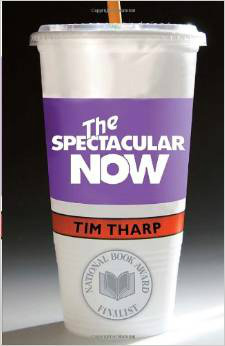However, if all that doesn’t scare you off, you might really enjoy this book. I know I did. Apparently, the National Book Award panelists of 2008 did as well, as they made The Spectacular Now a Finalist in Young People’s Literature.
The story is told by the protagonist, a high school senior called Sutter Keely. Sutter is all about experiencing life in what he calls “the spectacular NOW.” However, this is not the Oprah/Deepak/Eckhart Tolle spiritual path of living life completely in the present moment. No, this is the alcohol- and hormonally-enhanced adolescent tendency to act without thinking of the consequences that keeps parents awake worrying at night when their teenaged children are out with their peers.
So Sutter, an alcoholic in denial, is uninterested and uninvolved in his studies (for example, choosing to skip school so he can have sex with his girlfriend instead), unattached to his family (particularly the stepfather he finds robotic and the mother he believes drove away his more fun-loving father), and unmotivated at his job, which he defines as okay (explaining, “You know what an okay job is, don’t you? It’s a job you only hate some of the time instead of all of the time.”). But he is the life of the party, the guy with the jokes and the funny stories and the dead-on impressions that make everyone laugh, the guy who will do whatever ridiculous thing is necessary to ramp up the energy at any social gathering, and, of course, the guy who seems to have a never-ending supply of beer and whiskey, even though he is under the age limit to buy alcohol legally.
I know, I know….just the role model we want for our young people.
But this is a surprisingly deep and sensitive book. It captures some small but recognizable moments of life really well—the quality of light on a clear February day, the attempt to gain some control over a chaotic life by keeping one’s room immaculately clean and ordered, or the feeling you get when something you have really looked forward to isn’t living up to expectations and you try to do something, anything, to get it on track…or, maybe most of all, the idea that if you can only go back and answer some question from your past that you can create the future that you want.
And Sutter is a surprisingly deep and sensitive character. He isn’t a bitter alcoholic who seeks release from his problems through intoxication (well, not most of the time). He drinks because he finds that alcohol helps him live life in technicolor, rather than in black and white. He is kind and tries to help people out, even strangers or the ex-girlfriends who dumped him. He reads people well. He discusses philosophical issues with his best friend. And, of course, he tries to bring fun and energy to the lives of his peers who seem to be missing the juice in life.
Or is he? Since the story is told through his eyes, we might be getting a skewed picture of things. There are certainly some indications that not everyone views him in such a positive light.
Sutter ends up being a complex portrayal that could generate some great debate. In fact, there are lots of issues raised by this book that could make it a fantastic book for a mature high school or college discussion group. Sample of those potential discussions include what it means to “grow up,” male versus female approaches to power, relations between the sexes, when to stick to a plan and when to do with the flow, and perhaps most powerful of all, the differing attitudes and appropriate and inappropriate use of alcohol.
I would actually love to use this book as the foundation for some great conversations over such important issues. But I wouldn’t recommend it for people under maybe 16 years of age. I actually think the college level might be perfect for this book, once people have had a bit of experience of how different people approach both sex and alcohol and may be in a place to discuss the glories and the dangers of each of those enticing but potentially entangling fruits.
But if you are an adult, and if you are willing to read about high schoolers trying to figure out life questions by engaging in practices I’m sure we would all advice our children against doing, I think you will find this to be an engaging and thought-provoking read.

